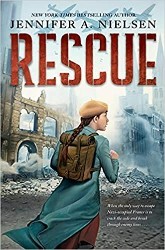Espionage and intrigue are at the center of Kathryn Lasky’s new middle-grade novel, a fast-paced World War II narrative that combines historical accuracy with imaginative invention. In a world in which any spy must be able to elude capture, thirteen-year-old Alice Winfield and her family are members of a special breed. Since the time of Tudor England, their ancestors have belonged to an organization whose members inherit the gift of anonymity: that is, no one will remember their faces, allowing them to pursue and defeat malefactors. In 1944, the Winfields go after the Nazis, who are out to destroy their country, the Jewish people, and the free world.
Readers are constantly asked to consider how secret agents must conceal their physical characteristics along with their personal qualities. For instance, when Alice and her family arrive in Berlin, they speak German and acquire the markers of cultural identity to protect themselves from discovery. Alice’s ironic bent overlays her descriptions of Claus von Stauffenberg — the courageous attempted-assassin of Hitler — and the hideous Fuhrer himself. It is difficult to mock the German dictator without running the risk of minimizing his inhumanity. Yet Lasky succeeds, in that Alice’s account of his disturbing actions is never meant to explain, or explain away, the nature of evil.
The story reaches its peak when Alice meets David Bloom, a young Jewish boy hiding from the Nazis. Her membership in a German youth organization for girls has familiarized her with the pseudoscience of racism and Nazi eugenics. Obsessions with blood purity and such dangers as having a “Jewish” nose are a constant part of the indoctrination. Alice finds David to be gentle and vulnerable; she associates him with a character from one of her favorite books, the frail Colin of The Secret Garden. It is a testament to Lasky’s skill as an author that this literary allusion is understated, a natural part of the way Alice interprets the world. David’s willingness to empathize with Alice, meanwhile, prompts her to ponder the mysteries of who she really is beneath the masks she must assume.
In an illuminating “Author’s Note,” Lasky discusses her fascination with World War II and explains why the principal characters in her novels about the era are not Jewish. In admitting that she feels drawn to creating characters who are distant from her personal identity, she articulates a truth about artistic creation and its desire to transcend boundaries.
Emily Schneider writes about literature, feminism, and culture for Tablet, The Forward, The Horn Book, and other publications, and writes about children’s books on her blog. She has a Ph.D. in Romance Languages and Literatures.





